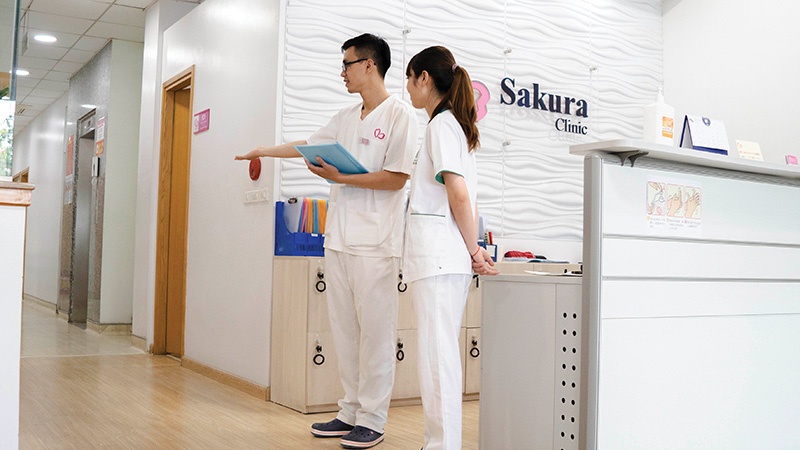Prospects abound for Japan in health
 |
| Market research forecasts that the scale of the local pharma industry could reach $16.1 billion by 2026, photo Le Toan |
Pham Thi Minh Chau, deputy head of the Ministry of Health’s International Cooperation Department, said at a webinar in late October on healthcare collaboration between Vietnam and Japan that cooperation had been strong in several areas.
“Promising areas of cooperation between the two countries are vaccines, research, cancer drugs, healthcare for older people, and the strengthening of bilateral cooperation between universities and health facilities,” Chau explained. “The ageing population is a top priority, and taking care of the elderly is one of the priorities of the government.”
Vietnam is faced with health challenges due to its rapid urbanisation, ageing population, climate change, and environmental health, and more people are requiring healthcare services and drugs. Meanwhile, Japanese businesses have strong expertise in these fields. Cooperation in the health sector has been highlighted by projects on regional and provincial hospital development; handbooks on maternal and child health; capacity development for a laboratory network on biosafety and highly infectious pathogens in Vietnam; and various training programmes for medical staff; among others.
The long cooperation between Vietnam and Japan was mostly accompanied by the Japan International Cooperation Agency (JICA). According to JICA’s chief representative in Vietnam, Shimizu Akira, Vietnam has been among the countries that registered the most successful cooperation with the organisation in the health field, reflected by projects such as upgrades at Bach Mai Hospital in Hanoi and Cho Ray Hospital in Ho Chi Minh City, along with the implementation of preventive measures against infectious diseases.
JICA also offered assistance in improving the testing capacity of the National Institute of Hygiene and Epidemiology and the Pasteur Institute of Ho Chi Minh City.
Japanese businesses in the sector also eye expansion. Yukinori Tominaga, representative at the Japanese Pharmaceutical Alliance in Vietnam (JPAV), said, “We expect closer collaboration with Vietnamese partners in production and manufacturing.”
JPAV members are active in technology transfer to produce measles and rubella vaccines and medical logistics management.
Tominaga added that access to medicine still faces difficulties in marketing authorisation and renewal for pharmaceutical products.
The JPAV now represents Japanese pharma firms like Taisho, Nipro, Daiichi Sankyo Co., Ltd., Rohto, and many others.
Dr. Koji Wada from Japan’s International University of Health and Welfare said, “People in Vietnam may enjoy many benefits from services developed and supported by Japan. Thus, collaboration among private institutions can also induce synergies in improving healthcare in Vietnam.”
Meanwhile, more Japanese pharma and healthcare companies are expanding towards Vietnam. For instance, Nipro Pharma, Japan’s biggest prescription drug manufacturer, finds the Vietnamese pharmaceutical market an appealing opportunity.
Hiroaki Sasaki, general manager of Nipro Pharma Vietnam, told VIR, “We will continue to focus on high-quality drugs with Japanese technology. Through our expansion, we are creating jobs for locals, and commit to long-term sustainable manufacturing.”
Nipro Pharma invested $150 million into its first plant in the northern port city of Haiphong, which started its operation in 2015. In 2017, the firm announced expanding its operations with a new $300-million project in Saigon Hi-Tech Park.
Similarly, the second-largest pharma company in Japan, Daiichi Sankyo Co., Ltd., has entered a licence agreement with Mitsubishi Tanabe Pharma Corporation to market edaravone, sold under the brand Radicava, to help patients with recovery following a stroke and to treat amyotrophic lateral sclerosis. The deal is one of several plans by Daiichi Sankyo for Vietnam. Last year, Daiichi Sankyo strengthened its presence in Vietnam by announcing the establishment of its Vietnamese arm as a wholly-owned subsidiary to conduct sales activities.
Elsewhere, Taisho Group, one of the five largest pharmaceutical firms in Japan, has increased its ownership in Hau Giang Pharmaceutical JSC, the biggest publicly-traded drugmaker in Vietnam, to 50.78 per cent.
According to the Japan External Trade Organization (JETRO), besides traditional investments in manufacturing, Japanese investors are also grasping other sectors such as healthcare. As demonstrated in the list of 30 Japanese companies planning to move from China to Vietnam, the Philippines, Malaysia, Thailand, and Laos announced last year by JETRO, half of those companies will shift to Vietnam, with the majority operating in healthcare.
Market research firm IBM forecasts that the scale of the Vietnamese pharmaceutical industry could reach $7.7 billion by late 2021 and up to $16.1 billion by 2026, with a compound annual growth rate of 11 per cent.
What the stars mean:
★ Poor ★ ★ Promising ★★★ Good ★★★★ Very good ★★★★★ Exceptional
Themes: Healthcare Platform
- Hanoi intensifies airport monitoring amid Nipah disease risks
- Cosmetics rules set for overhaul under draft decree
- Policy obstacles being addressed in drug licensing and renewal
- Sanofi, Long Chau Pharmacy relaunch medicine blister pack collection initiative
- Takeda Vietnam awarded for ongoing support of Vietnam’s sustainability efforts
Related Contents
Latest News
More News
- State corporations poised to drive 2026 growth (February 03, 2026 | 13:58)
- Why high-tech talent will define Vietnam’s growth (February 02, 2026 | 10:47)
- FMCG resilience amid varying storms (February 02, 2026 | 10:00)
- Customs reforms strengthen business confidence, support trade growth (February 01, 2026 | 08:20)
- Vietnam and US to launch sixth trade negotiation round (January 30, 2026 | 15:19)
- Digital publishing emerges as key growth driver in Vietnam (January 30, 2026 | 10:59)
- EVN signs key contract for Tri An hydropower expansion (January 30, 2026 | 10:57)
- Vietnam to lead trade growth in ASEAN (January 29, 2026 | 15:08)
- Carlsberg Vietnam delivers Lunar New Year support in central region (January 28, 2026 | 17:19)
- TikTok penalised $35,000 in Vietnam for consumer protection violations (January 28, 2026 | 17:15)

 Tag:
Tag:




















 Mobile Version
Mobile Version